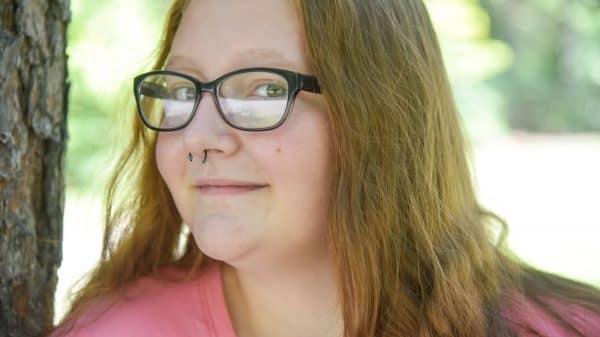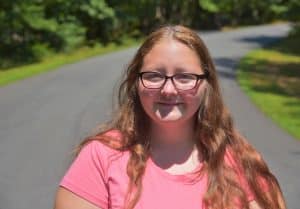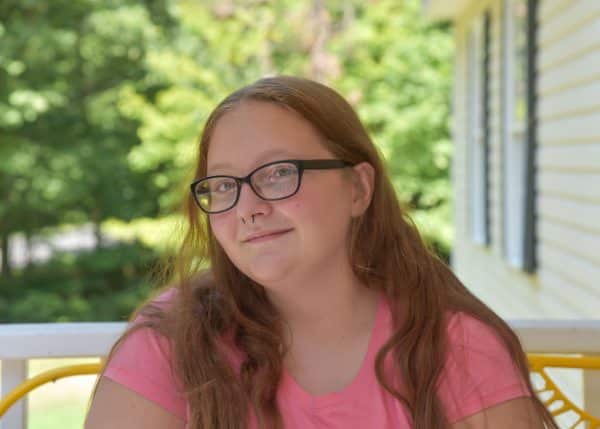Mackenzie remembers arriving at the Child & Family Healing Center in Richmond at 13 years old. She was confused, frightened and “angry at myself because of why I was there and how I got there,” she said.
But what Mackenzie didn’t understand at the time is that her circumstances were no fault of her own. There was no blame for her to shoulder, nor should blame be placed on the other children and teens who are referred to residential programs. Instead, trauma is the culprit. And for young people who’ve experienced adverse experiences, it’s often a lack of skill, not will, that’s preventing them from achieving their goals.
Such was the case for Mackenzie, who entered foster care when she was 6. Before CFHC, Mackenzie had lived with extended family and in various residential programs, group homes, and a juvenile justice facility. All throughout her childhood, she was simply ill-equipped to cope with the trauma she had endured. “I grew up rough,” she said. 
What Mackenzie needed then were tools for success so she could build healthy relationships and achieve her goals. What she needed was sustained support. At CFHC and UMFS, Mackenzie said that’s exactly what she found.
She found support among her peers. “You learn a lot of incredible things from people who have been in similar situations,” Mackenzie said.
She found it among the CFHC and UMFS staff. “I learned mindfulness. I didn’t even know what that was until my therapist at UMFS taught me.”
She found it in the CFHC program itself. “There were festivals and sports and a greenhouse,” Mackenzie said. “There’s a school on campus, and I got to meet new people. There were just a lot of things that were a lot of fun.”
And even after Mackenzie completed treatment at CFHC, she continued discovering supports. “I had gone to live with a UMFS foster family,” she said. “I loved them so much.”
As is often the case, Mackenzie’s foster care placement was temporary. “I lived with them for about a year,” she said. “About three weeks after I left their home, I realized I messed up. They were really good to me.”
This is the reality for youth in foster care: Sometimes things change, but sometimes it’s the temporary situations that lead to other opportunities for growth. Though Mackenzie didn’t achieve permanency with her foster family, what she did gain was a healthy, natural support. “We still keep in touch,” she said.
 Furthermore, it was through her former foster family that Mackenzie learned about Project LIFE (Living Independently Focusing on Empowerment), a partnership with Virginia Department of Social Services that offers older youth in foster care tools and resources to help them prepare for young adulthood.
Furthermore, it was through her former foster family that Mackenzie learned about Project LIFE (Living Independently Focusing on Empowerment), a partnership with Virginia Department of Social Services that offers older youth in foster care tools and resources to help them prepare for young adulthood.
Mackenzie, who’s now 20, said Project LIFE was instrumental during her teenage years in helping her build the confidence and skills to manage all that has come her way as a young adult. “Project LIFE is there to support you,” she said. “They don’t judge you, and they build you up.”
George Mack, Program Manager for Project LIFE, first met Mackenzie when she was 15. “She was very shy and didn’t know where to find resources,” George recalled. “But she grew in her experience with Project LIFE, and that’s rewarding to see.”
And Mackenzie certainly has grown. She has a stable home, a job she enjoys, and a world of opportunity in front of her. “I never would have thought I’d be where I am today,” she said. And as for what’s next? “That’s to be determined,” Mackenzie said with a smile.
George said he couldn’t be prouder of all that Mackenzie’s accomplished. “It’s why we do what we do,” he said. “We don’t always get to see the successes, but we know if we start working with youth at maybe 14 years old, in four years we might see something blossom. Mackenzie still checks in with Project LIFE, and I definitely appreciate that.”
Mackenzie said there’s a lot she appreciates, too. From her days at CFHC, to the opportunity she had with her former foster family, to the lessons she’s learned from Project LIFE, Mackenzie said UMFS helped her grow into the young woman she is today.
“Looking back to the person I was then and to the person I am now,” Mackenzie said. “The difference is significant.”
*
At UMFS, we offer a number of services to help young people like Mackenzie achieve their goals. When you invest in UMFS, you invest in critical services and supports designed to help youth as they work to overcome challenging situations. Visit UMFS.org/donate to learn more.
